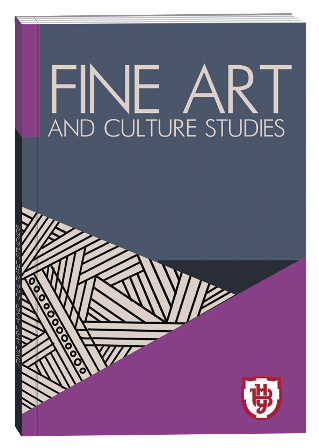THE LIBRETO AS A TOOL FOR CREATING MUSICAL PORTRAITS IN THE MUSICAL “EQUATOR” BY OLEKSANDR ZLOTNYK
DOI:
https://doi.org/10.32782/facs-2024-4-5Keywords:
modern Ukrainian music, musical, work of Oleksandr Zlotnyk, artistic translation.Abstract
The article explores the pivotal role of the libretto in the creation of musical imagery within the musical “Equator” by Oleksandr Zlotnyk. The purpose of the work is to is to determine the specifics of Oleksandr Zlotnyk’s work from the libretto of the musical “Equator”.The study reveals that in “Equator” the libretto does not merely provide a framework for musical and stage interpretation but also plays a crucial role in defining the work’s structural and stylistic unity. The research methodology involves a comprehensive analysis of both the original Russian libretto and its Ukrainian translation, alongside a detailed examination of the musical score. This approach allows for an in-depth exploration of the relationship between the poetic content of the libretto and the intonational dramaturgy of the music. Methods from historical musicology were employed, along with textual analysis, to scrutinize the structure and content of the libretto. Scientific innovation of the article lies in its pioneering analysis of the libretto’s role in the creation of musical images specifically within the context of “Equator”. Conclusions. The study highlights how the textual characteristics of the libretto influence the musical dramaturgy, shaping character development and establishing the emotional tone of the work. It uncovers that the libretto in “Equator” serves not only as the narrative backbone but also as an active participant in the musical and figurative creation, significantly enriching the artistic content of the musical. The article emphasizes the multifaceted function of the libretto in transforming musical images, particularly in its Ukrainian translation. It demonstrates how the libretto establishes thematic lines that underpin the musical drama, supports character development, and articulates internal conflicts and interactions. Moreover, the study shows that the libretto’s interaction with the musical score deepens the artistic integrity of the work, creating a seamless blend of literary and musical imagery that enhances the overall impact of the musical.
References
Бондаренко А. Мюзикл як інтонаційна практика. Вісник КНУКіМ. Серія «Мистецтвознавство», 2022. (46), 78–86.
Зайцева І. Є. Деякі тенденції розвитку українського мюзиклу як мистецтва і галузі шоу-індустрії. Молодий вчений, 2017. (10), 262–267.
Зінченко В. Балет «Hopper» Максима Шалигіна: на перетині міжмедіальної інтерпретації та художнього перекладу. Науковий вісник Національної музичної академії України імені П.І. Чайковського, 2021. (131), 154–166.
Злотник О. Й. Комунікативний простір музичного мистецтва України кінця ХХ – початку ХХІ століття. Кваліфікаційна наукова праця на правах рукопису. Дисертація на здобуття наукового ступеня кандидата мистецтвознавства за спеціальністю 26.00.01 «Теорія та історія культури». – Національна академія керівних кадрів культури і мистецтв, Міністерство культури України. Київ, 2019. 254 с.
Зосім О. Л.Традиційна естрадна пісня: концептуалізація поняття. Вісник Національної академії керівних кадрів культури і мистецтв, 2022. (2), 153–158
Оганезова-Григоренко О. В. Почуття ритму як особлива форма усвідомлення інтонаційного враження (на прикладі творчого алгоритму артиста мюзиклу). Музичне мистецтво і культура, 2022. 1(35), 5–15.
Хуторська А. Й. Композиторська інтерпретація поетичного тексту як художній переклад (на прикладі камерно-вокальної музики) : автореф. дис … канд. мистецтвознавства : 17.00.03 Музичне мистецтво / Харківський держ. ун-т мистецтв ім. І. П. Котляревського. Харків, 2009. 17 с.
Чепалов О. І. Балетне лібрето як предмет концептуального аналізу хореографічного твору (на матеріалі творів українських композиторів). Танцювальні студії, 2021. 4(1), 10–19
Rudolph A. (2015). Für und Wider die Librettologie: Zu Geschichte und Kritik einer Librettoforschung des Gesangstheaters (Doctoral dissertation).
Wang Na. (2020). Operas on Gogol’s plots in the compositions of contemporary composers: from libretto to the problem of plotology. Music Art and Culturе, 1(30), 106–111.







